This is NOT the first time it has happened.
Nepali men making false assumptions and, based on them, making wild claims but when challenged and presented with counter argument/information, not acknowledging their mistake, forget about apologizing, happened again recently. (Click here and here for examples from the past.) This time on Facebook.
Two men made unwarranted and ill-informed assumptions about, firstly, a news source based on some bias they appear to have against it, and secondly, the content of a blog post of mine based ENTIRELY on the content of the featured image. I challenged both the assumptions and invited them to actually read the blog!
One didn’t continue the exchange! The other did appear to take up on my invitation. But then, instead of conceding the mistake, he went on to express his opinion about either the writing or the subject/content of blog or both. I could’t quite determine which!
It all started with a female Facebook friend sharing a link to the blog post.
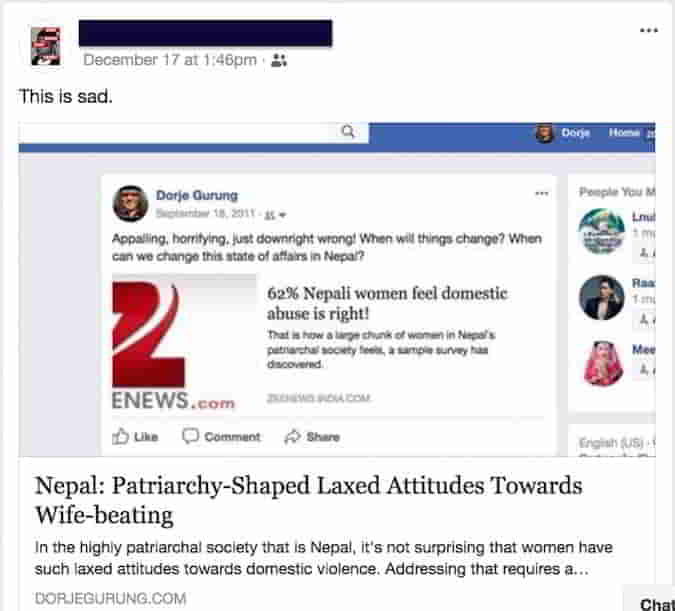
Two Nepali men commented saying that Zee News is fake. Here’s the first one where the guy has an issue with the media because it’s “not a proper Nepali news channel.”
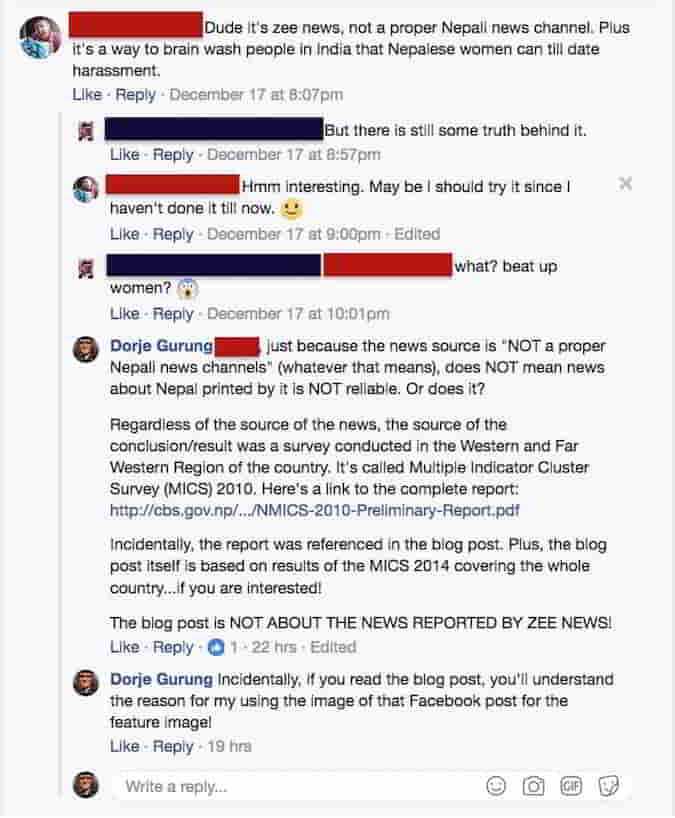 (The above man didn’t respond to my comments, as you can see. We’ll ignore his wondering if he “should try it.”)
(The above man didn’t respond to my comments, as you can see. We’ll ignore his wondering if he “should try it.”)
Here’s a reproduction of the comment by the second man who also doesn’t trust the news source. He believes “zee news is not news” to which I also responded with pretty much the same comment.
 He didn’t respond immediately. In the mean time, a Nepali woman recognizing the issue with the men and their comments, pointed out the problem and I went on to respond to her by saying how Nepalis are expert deflectors.
He didn’t respond immediately. In the mean time, a Nepali woman recognizing the issue with the men and their comments, pointed out the problem and I went on to respond to her by saying how Nepalis are expert deflectors.
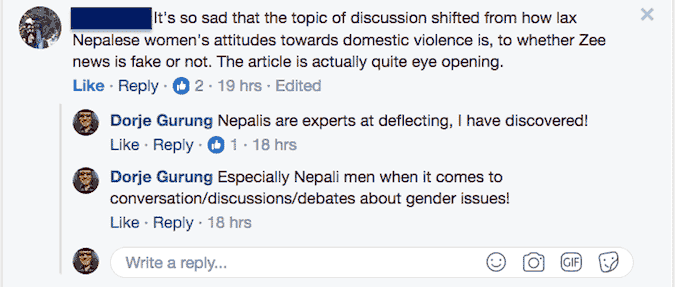
About three hours after my second comment above, as if on cue, the second man responded…by deflecting!
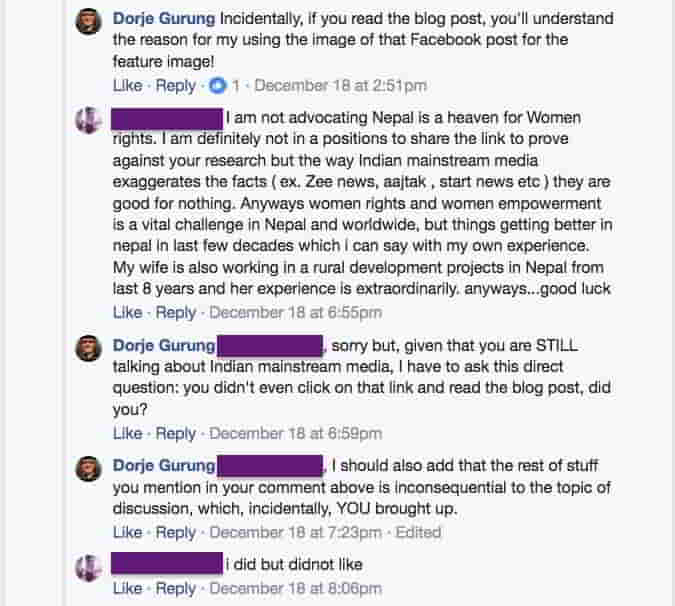
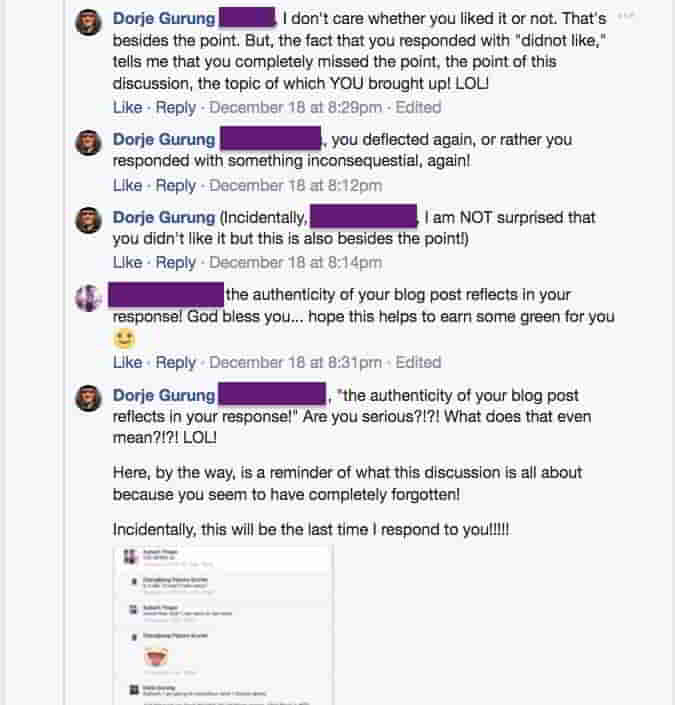
What of the other times this has happened?
I have had experiences with Nepali men refusing to acknowledge their mistakes — forget about apologizing for them — again and again not just on social media (such as Facebook and Twitter) but also in real life.
These men include family members, relatives, cousins, friends, acquaintances and other Nepalis, including strangers I have crossed paths with.
I have had incidents where I show up — on time — for an appointment and the other guy is late, or doesn’t show up, AND does not call or text! I have had to call to find out what had happened! Forget about apologizing!
I have been in situations where I have had to wait for a long time for meetings and have not received even a hint of an apology! Once after waiting for two and a half-hours for a meeting with a man, far from him apologizing, after the meeting, I remember walking away with the distinct feeling that I was supposed to have been thankful that he met me!
Worst of all, returning to Nepal in May 2013, after the most traumatic experience of my life, while I was trying to deal with that and trying to deal with a host of other issues and challenges around living and working in Nepal (after spending pretty much all my adult life abroad etc.), I learned that there were those who, feeling let down by my not fulfilling some of their expectations, distanced themselves and/or completely severed all ties with me. As and when I discovered that, I did what I could to try to help them understand the major issues I had been contending with. Except, not a single one of them — pretty much every single one of them a man — even acknowledged any of that, forget about apologizing! I, on the other hand, have appologised publicly in a blog post for potentially offending anyone unknowingly.
Lastly, I have also observed that it’s rare indeed for men in positions of social, economic, political power and positions of influence — such as celebrities, journalists, TV personalities etc. — to publicly admit to a mistake AND apologize. So rare as a matter of fact that I can’t remember seeing or hearing or reading about one doing so in the few years I have been living in the country!
So, why do Nepali men struggle to admit their mistake AND apologize for it? Why?
Is it some unusual brand of male chauvinism, or male machismo? Do Nepali men believe that they would lose their manhood and all respect — both self-respect and respect from others — if they ever acknowledged any mistake and apologized? (What I do know is that we are a very insecure bunch!)
Is it our patriarchal culture and society to blame? Does Nepali patriarchy engender a very particular and somehow unique male sense of entitlement and privilege fostering a belief that they don’t have to admit to any mistake, forget about apologizing?
Or, maybe, when they make a mistake, they don’t even know or realize that they have done so because they believe that they are infallible? Is that part of the problem?
Or is it a problem with the way Nepali men think and reason? In other words, is it our poor quality of education to blame? Our education system does not impart critical thinking skills. I would be impressed if, of the 34K schools in the country, just a couple of hundred actually imparted some critical thinking skills to their students. It’s not surprising then that Nepali people in general struggle with thinking — and reasoning — logically. Could their inability to think critically be contributing to this kind of attitude and behavior?
Or maybe the reason has something to do with the combination of the fact that Nepali society is so stratified and hierarchical, and Nepali men’s consciousness — and idea — of social status? Maybe it’s the fear of losing ones higher standing in the social ladder if one admits to ones mistake AND apologizes, especially to someone you consider — for whatever reason (caste/ethnicity, class, gender, age, financial worth, title/position etc.) — to be of lower status than you? The higher up in the social ladder one is, the belief — as I understand it — is that the lower the fallibility of the individual and higher the respectability!
Or is it something else, or other reasons, entirely?
I am really curious!
Oh, for the benefit of those Nepali men who are expert at deflecting a discussion or debate with a whataboutism, let me get this out of the way so that they won’t have to bring it up: “What about men of other nationalities? Some or many I am sure struggle with that issue too.” Yes, I agree! I am sure there are men of other nationalities who struggle with that too! (Click here for a good article on whataboutism.)
Furthermore, I am NOT in any way saying that ALL Nepali men struggle with this! No sir!
What do you think?
References
Not quoted or referred to in the blog post but included here for their relevance.
Even in these grave times of the coronavirus pandemic, the members of the highest level committee formed to tackle the fight against it, instead of admitting and apologizing for a mistake they made, they are actively trying to hide the mistake going to great lengths, including either deactivating or deleting a verified, i.e. the official, Facebook page of the Office of the Prime Ministers and Council of Ministers. Here are two articles detailing that: बस्दै नबसेको बैठकको सूचना सार्वजनिक गर्ने प्रधानमन्त्री कार्यालयको ‘भेरिफाइड’ फेसबुक पेज एकाएक निष्क्रिय (HimalKhabar, April 9, 2020); First came a blunder retweet, and then fake news from the govt (MyRepublica, April 10, 2020). The arrogance and ignorance of these official is likely causing a great deal of suffering to many in the country. [Added on April 11, 2020.]
